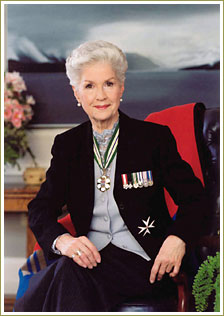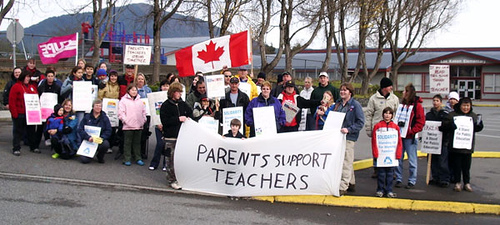
Iona Campagnolo, BC’s Lieutenant Governor, opened the provincial legislature today (Febraury 14, 2006) with a speech that places a heavy emphasis upon edcuation. The speech builds upon the neo-Liberal provincial government’s four and one half years of radical transformation with promises of continued change. In language evocative of early 20th century political experiments and great leaps forward, the Lietenant Governor promised that: “British Columbia’s great transformation has just begun.”Edcuation segment of the throne speech (full text here)
Download in pdf format
Harnessing the Power of New Knowledge and Creativity
The transformational force of knowledge and technology is reinventing our world. The new world is a truly global economy, driven by information, ideas, and discoveries.
It is a creative economy, where art and culture are the building blocks of innovation, invention, and understanding. Your government wants to unleash the talent, creativity, and skills of all who live here.
Education is the key to that endeavour.
Over the coming months, the Premier and Education Minister will visit every school district in B.C. They will meet with educators, parents, and students to seek their ideas for positive change in education.
Your government wants to hear from teachers in their staffrooms and from students in their classrooms. It ran on a pledge to communicate directly with all teachers in B.C. – and it will act to make that possible. It wants to listen and learn at the community level, at the new Learning Roundtable, and at a first-ever Teachers’ Congress, to be held later this year.
Although the education budget will go up again this year, we must ask ourselves how we can use that funding to best serve students.
The information your government has recently collected and published on class sizes gives us new data for discussion. It points to the need for legislative changes that will ensure all school districts live within the current class size limits established in law.
If there are variations that make sense for students, parents should have a say in those decisions. While superintendents should be required to approve those decisions, school boards must ultimately be accountable.
The issue of class composition is even more challenging and demands a rational discussion. What more can we do to help all students in every classroom?
How can we better help those with special needs, in public schools and independent schools alike?
Are there ways to better maximize the benefit of our capital investments in education?
What more can we do to ensure greater accountability to taxpayers? What is the appropriate mix of local autonomy and flexibility in decision-making?
How might we modernize our curriculum to ensure it offers relevant instruction for the modern world? What changes might be made to give our students a better understanding of our province’s rich, colourful history and a fuller appreciation of our Aboriginal heritage and culture?
What new content should be taught about the importance of forestry, mining, energy, agriculture, and sustainable stewardship to our communities and our economy?
How can we foster a culture of excellence in teaching and learning that builds upon individual strengths and celebrates achievement?
All of these questions oblige us to open our minds to new possibilities for improving public education. We will not succeed in providing our children the best education if we fail to ask the critical questions and refuse to consider changes that will make our education system the best it can be.
We must aspire to make public education more relevant to students’ needs and more accountable at every level. We must aspire to excellence in teaching and learning, through greater choice and flexibility, and new opportunities for parental involvement.
This is your government’s vision for education and literacy.
It is an agenda of transformative change that looks at the new world through new eyes, with new intent to act.
The Internet offers incredible potential in that regard. This year, your government will initiate a new “virtual” school to provide B.C. students a new option for learning that is accessible from their local schools and within their homes.
Supported by Network BC, it will offer a full range of courses that will especially benefit students in rural communities. It will enable students to construct high quality programs of instruction that are more relevant to their individual interests and that are open for learning at any time, at any pace, and from any place.
The virtual school will also provide free, on-line tutoring to help secondary school students successfully complete their studies. That tutoring service will be extended to earlier grades in coming years. Several jurisdictions have successfully developed cyber schools and British Columbia will not allow our students to be left behind.
All British Columbians will have equal opportunity to benefit from the knowledge economy.
In 2006, your government will fulfill its commitment to bridge the digital divide by bringing high-speed Internet access to 366 communities across B.C. that previously lacked broadband access. New steps will be taken to extend that access to First Nations communities, working in partnership with the federal government.
Your government will continue to encourage the full participation of parents in their children’s education. Parents will be critical drivers as we transform education services across our province to meet the needs of their children.
This year, a new province-wide Parents’ Education Network will be launched to provide parents with up-to-date information on programs and research that can help their children excel in school. The Parents’ Education Network will help parents answer questions and engage in discussions about the challenges, opportunities, and possible solutions they see in education.
Parents want greater access to information in education. Your government committed to publish annual reports for all public schools on the key statistics relating to class size, class composition, and teacher hirings, terminations, disciplinary actions, and professional development. That commitment will be fully realized this year.
It will also act on its pledge to establish a teacher employment registry that is administered by the College of Teachers, to publicly report the names of teachers disciplined for misconduct involving emotional, physical, or sexual abuse.
New investments will be made to give all British Columbians new options and better access to higher learning. Your government is creating 25,000 new post-secondary spaces – the largest expansion in advanced education in 40 years.
Additional steps will be taken to allow new transferability of credits for students attending accredited private post-secondary institutes.
All of these measures will help British Columbians gain the education and skills they need to successfully compete in the new knowledge economy.
We will need more skilled workers in energy, construction and related trades, forestry, mining, agriculture, engineering, and technology. Filling all of those jobs requires us to expand training for British Columbians and to compete for more foreign-trained workers.
There is no place for parochialism or provincialism in the new world. Your government will work with other provinces and the federal government on a national action plan for skills development.
It will act this year to further expand the provincial nominee program. It will act to expedite the flow and credentialing of foreign-trained workers who are needed now to meet domestic demands.
The Industry Training Authority will expand its programs in trades training and apprenticeships. New initiatives will be launched to encourage employers to renew their efforts and investments in skills training.
The new global economy is ultimately driven not just by mastering what we have learned, but by the pursuit of new knowledge. As such, more will be invested this year in new research aimed at leading discoveries and commercializing their potential.
Your government will work with B.C.’s technology industry to pursue its vision for a comprehensive technology strategy. The BC Hub strategy will transform our approach to technology research, commercialization, and capital expansion, with new efforts to integrate science, technology, and knowledge into our resource industries, agriculture industry, and manufacturing economy.
British Columbia is becoming world-renowned in life sciences and biotechnology. We led the world in fighting SARS and continue to lead in genome research. Both are critical tools as we prepare for the next global pandemic.
Genome British Columbia is producing ground-breaking discoveries that will benefit our natural resource industries, our environment, our agricultural industry, and the future health of our population.
Major new research investments will be made this year to support the work of Genome BC and to accelerate discovery in spinal cord research through the Rick Hansen Man in Motion Foundation.
Your government will work with the Canadian Cancer Society, B.C. and Yukon Division, to establish a research chair in primary prevention of cancer.
A new B.C. Foundation for Natural Resources and Engineering Research will also be launched this year. It will support advanced training, research and development, technology transfer, and commercialization in natural resources, engineering, and applied sciences.
This will help keep our resource sector competitive and sustainable in the face of challenges like the mountain pine beetle, while growing new sectors and fueling economic growth.
Alternative energy will form an integral part of your government’s expanded energy vision. It is a critical part of your government’s goal to improve air and water quality, and fisheries management.
That goal also obliges us to set new goals in conservation. The updated energy vision will include new conservation targets to help make British Columbia electricity self-sufficient within the decade ahead.
Your government will also provide the financial thrust to create a leading edge new digital media centre at Great Northern Way, through a collaborative partnership of UBC, SFU, BCIT, the Emily Carr Institute of Art and Design, and the private sector.
This will confirm B.C.’s global reputation as a leader in digital media and will further stimulate opportunities for growth in digital entertainment.
 On November 9th, 2005 UBC faculty members, parent organization representatives, teachers, and community leaders met to discuss the significance of BC’s longest lasting province-wide teachers strike. Presentations from Catherine Evans (BCSPE), Jinny Sims (Pres. BCTF), Paul Orlowski (Van. Teacher), Kevin Milsep (former VSB trustee), and UBC faculty members Charles Menzies, Stephen Petrina, and E. Wayne Ross discussed a range of issues related to the strike.
On November 9th, 2005 UBC faculty members, parent organization representatives, teachers, and community leaders met to discuss the significance of BC’s longest lasting province-wide teachers strike. Presentations from Catherine Evans (BCSPE), Jinny Sims (Pres. BCTF), Paul Orlowski (Van. Teacher), Kevin Milsep (former VSB trustee), and UBC faculty members Charles Menzies, Stephen Petrina, and E. Wayne Ross discussed a range of issues related to the strike.
